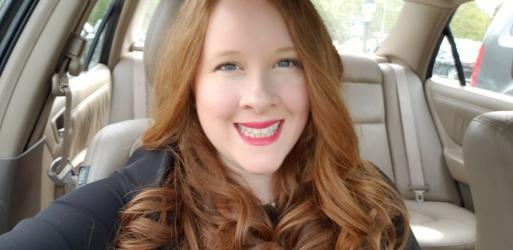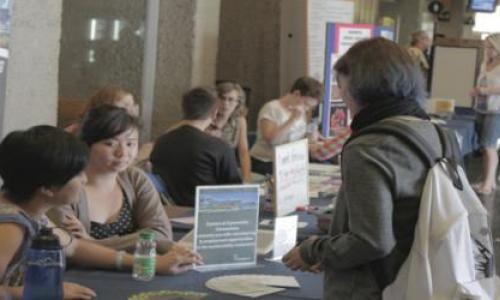
Hi, I’m Julia Brown, I’m planning to attend the West Coast Virtual Fair on November 17th and 18th to learn about options for my future and the fields of work I’m interested in.
First, a little about me. I am an SFU student pursuing a joint major in Sociology and Communications, and I’m a volunteer Career Peer (CP) Educator with SFU Career and Volunteer Services. The question about what year I am in is a tough one to answer - in terms of my SA courses, I am in my fourth year, but with my CMNS courses, I am only in my second year…to simplify it, I’m about a year and a half away from graduating.
I have been thinking about the moves to make after my undergrad degree and have a lot of questions. Do I take my degree and enter the workforce? What sector should I go into, public, private, non-profit? What are employers looking for in recent social science grads? What marketable skills do I possess? Do I continue my educational path and choose grad school? If I go that direction, are my grades even good enough? What school do I choose, how do I select a research topic or narrow down my areas of interest? And what other considerations should I think about…? Already, I am overwhelmed by the questions I am asking, and intimidated about the future decisions I will have to make.
Luckily, I have found an area of study that I am passionate about: examining social conditions in a digitally connected world (ok, it might not be your thing, but I’m into it!). So, it’s my idea that I’ll attend SFU’s fair and see if I can learn what employers and grad schools would be a good fit, and how I can leverage these interests into careers. I’d like to ask my questions, feel safe asking them, and learn about real-world opportunities.
Here are some steps I’ve taken to prepare:
1. I got practical and updated my resume. Even though it’s optional to share your resume on the platform, I’m going all in. Why not!? Through my training to become a CP, I have accessed a wealth of knowledge from professional career educators, along with some tips for creating an impactful and visually appealing resume (an advantage all SFU students and alumni have by accessing the CV&S office, by the way!). Then, I uploaded it. You’ll need to register and create a profile first.
2. I checked out the wide variety of companies, organisations, and grad schools on the exhibitors list. I did some research into the sessions I most wanted to attend, and made use of the filter selection by opportunities (full-time/part-time work, graduate programs or training certification or volunteering), area of study, industry or career type, location, or skill set. With 30 pages of options for my search terms, the interface provided information about schools, programs, companies, contact info, websites, content, and times they were available.
After selecting some institutions I wanted to learn more about (like indulging the travel bug within me with the Study in Scotland info sessions, and then being more realistic with the SFU and UBC sessions), I turned my focus to part-time, summer and volunteer opportunities. Here I made use of the career field filters and I selected ‘project management’, ‘research’, ‘social work’ and ‘equity, diversity, and inclusion.’
3. I made a schedule that worked for me. My expectation when I sat down to plan my schedule was that it would be two jammed packed days, 9 am to 6 pm, of 1:1 meetings and info sessions. That I would have to schedule myself a lunch break and remember to stretch my legs or drink some water before hopping into another virtual room. Yet when I started narrowing down my personal interests and being selective about what I wanted to learn more about, I ended up with a more refined and reasonable schedule of two hours on the first day and an hour on the second day. Being able to take mental breaks in between sessions and giving myself time to internally contemplate the new information I will be receiving, felt like the best way to make the virtual experience work for me.
4. With registering and scheduling now complete, my next steps in planning is to prepare some questions. Well this should be easy – as above, you already know I have many! But at this stage, I got to work refining them and making them specific to the speaker or organization I was going to drop in on.
I can’t help but think that if this were an in-person event, I would have to factor in travel time, plus the time I would spend wandering around, trying to build up the courage to approach a booth, then chastising myself that I hadn’t done my research and prepared questions in advance. That I had sacrificed valuable study time and wished I’d known better how to make the most of talking to people about my future. This year, although the access feels different – I mean, everything about this year is different – I feel organised with my time, my research has helped refine my interests and identify specific organisations, and I am making good decisions for me.
I know I am not alone in my questions, uncertainties, and fears about planning for the future. Like all students, I want to find some real options. I am learning to make the most of resources while I’m still in school, and I feel good about my chances of getting some workable information and ultimately providing myself with some answers regarding my future planning. Wish me luck, and hope to see you there!
Beyond the Blog
-
Register for the West Coast Virtual Fair today!
-
To get help with your resume, cover letter or online career related resources, like LinkedIn, meet with a Career Peer Educator. To start your career exploration and learn what your degree is going to mean outside of post secondary, talk to a Career Education Specialist. Appointments can be made at careers@sfu.ca.














